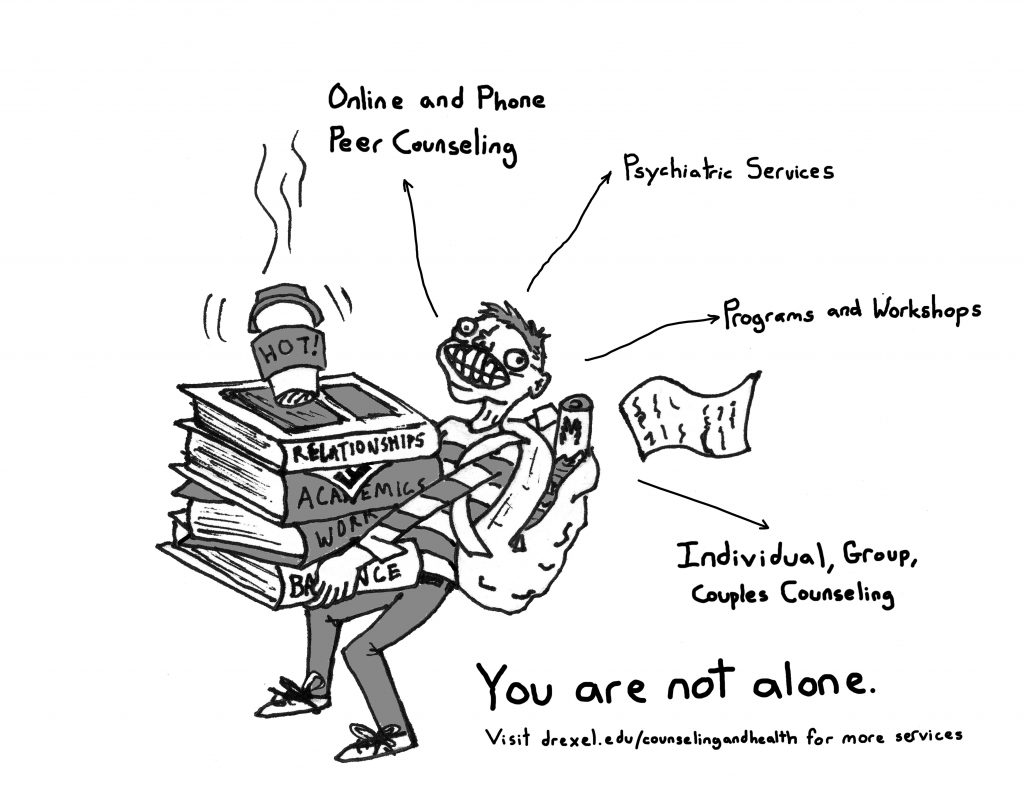
The winds of change are upon us and as the days get shorter and the once clear skies remain overcast for hours on end, perhaps a different metaphor plays out in the minds of students at Drexel University. New students are perhaps just waking up to the reality of the Drexel system with 8 a.m. examinations suddenly dropping on their laps. For some, the first Co-Op job does not seem to be as cushy as they dreamed it to be. For others the vagaries of living in the city, away from the comforts of home are just beginning to hit hard. And when the October blues hit, most students turn to the next available resource, the Drexel Counseling Services. However, for most people this experience falls short of the ideal that such a service ought to entail.
The Counseling Center operates in a method not foreign to colleges and universities, where a short-term, free treatment model is employed. Unfortunately, it’s hard to gain a clear picture of what this means; even the website is vague, stating only: “Due to a high demand for services, and to ensure that the most number of students receive services, the center sets a limit on the total number of individual counseling appointments students may receive.” It seems as if in the past two to three years, student experiences have anecdotally marked a transition from a mix of long-term and short-term care at the center to a fully short-term model with no exceptions in recent months. This shift seems also to be marked by the staff changes that have occured at the center in the past six months.
The Counseling Center is alarmingly under-staffed, with only one psychiatrist working part-time for a student body that is constantly expanding. The 2017-18 school year staff, however, featured a full-time psychiatrist, whose hours were decreased throughout the year until she left Drexel over the summer. Just ten full-time staff psychologists serve the entire center, and doctoral interns and Psychology externs together participate in rotational practices at Drexel, but supply only a few more therapists a year (nine for 2018-19). These interns and externs are therapists at the Counseling Center for an academic year, and leave once their rotations end; this means that a patient paired with an extern will only have a maximum nine months with their intern/extern therapist before being referred to an outside practice. Such understaffing may play a role in the many ways that the Drexel Counseling Center fails to meet the gold standard of care for students in its charge.
The only psychiatrist available for medication management treatment at Drexel is male. On the surface this might seem like a trivial issue; he is a friendly, trained professional equipped with both tools and experience in addressing several issues with care and compassion. However, such singularity does not address the diverse gender dynamics that are at play in some cases such as sexual assault. Students that have survived sexual assault experiences may need or strongly desire a gender balance with their care providers to be more comfortable, including and extending beyond mental health care. With only one psychiatrist available, and being only part-time (he is only on campus on Thursdays), students referred to medication management through Drexel’s counseling services will have no choice but to work with the staff psychiatrist available or seek care in an outside facility.
Moreover, Drexel’s counseling team offers only one caseworker, who is tasked with helping students find an external care provider once their time at the Counseling Center has expired. Students aren’t instantly referred to the case manager upon exiting the counseling center, and their decision whether to continue treatment or not is their responsibility unless they reach out for assistance. While this system probably works “well enough,” it is also arguably irresponsible. Students that have required counseling may not be in the best position to proactively seek new care, and finding a new therapist to connect with (especially after having only a brief amount of time with a Drexel provider) can be challenging for students experiencing distress with their mental health. It’s too easy to imagine a student falling through the cracks after being pushed out of the Drexel Counseling Center, and indeed various student anecdotes have claimed this experience as a shared one as they found themselves not enrolling in long-term treatment and abandoning their medication plans upon dismissal from the Counseling Center, citing a lack of energy to seek further treatment or insufficient insurance to gain affordable mental health care elsewhere.
As we move past World Suicide Prevention Day (Sept. 10) and Mental Health Awareness Week (Oct. 7-13) the eerie silence from Drexel administration regarding mental health awareness is disturbing. For a school that is consistently and irresponsibly increasing its freshman class, pushing that “ambition can’t wait” and offering one of the most challenging academic environments a college student could imagine, Drexel’s Counseling Center clearly remains under-prioritized in budgets and resources. Once again we find an instance in which Drexel’s administration continues to underfund and ignore the very programs and services keeping the student body engaged, happy and healthy, and once again we demand better.
–The Editorial Board also wishes to commend the Counseling Center on the fantastic services they are able to provide despite the challenges they face with staffing, space, and a large student body. For a full list of resources offered by the Counseling Center, please visit drexel.edu/counselingandhealth.


